Find yourself in need of an apple juice substitute? We’ve got the ideas that should work just right for your needs.
While apple juice is immensely enjoyable as a beverage, this versatile ingredient also finds its way into a ton of recipes, including those for cocktails, marinades, baking, cooking, and more. As such, our choice of substitute will also be guided by the application we intend for the apple juice. Because what works for a cocktail might not necessarily work for a marinade.
But more importantly, aspects of the flavor profile and desired results need to be managed as well. As such, in many cases, we might not just want to substitute apple juice with something similar, but we could consider replacing it and let the recipe take a different direction. As an example, it is possible to completely skip apple juice from ribs (whether as marinade or spritzer) and still enjoy a lovely dish.
We’ll get to all the details later, for now let’s see what our best options are for a substitution.
In many cases, the desirable apple juice substitutes include apple cider, other fruit juices and ciders (pear juice, white grape juice, etc.). We’ll also discuss some vinegar options (apple cider vinegar, champagne vinegar, etc.) but will not recommend this path. In some cases, sodas, beer, or even stock could be useful substitutes.
As you may notice, these substitutes are designed in a way that doesn’t necessarily substitute apple juice, but also in some recipes, lets other ingredients handle the functions of apple juice.
Let’s get a bit detailed to see how things measure up!
Table of Contents
Apple Juice Substitute Ideas, Alternatives, And Replacements For Various Recipes
1. Apple Cider
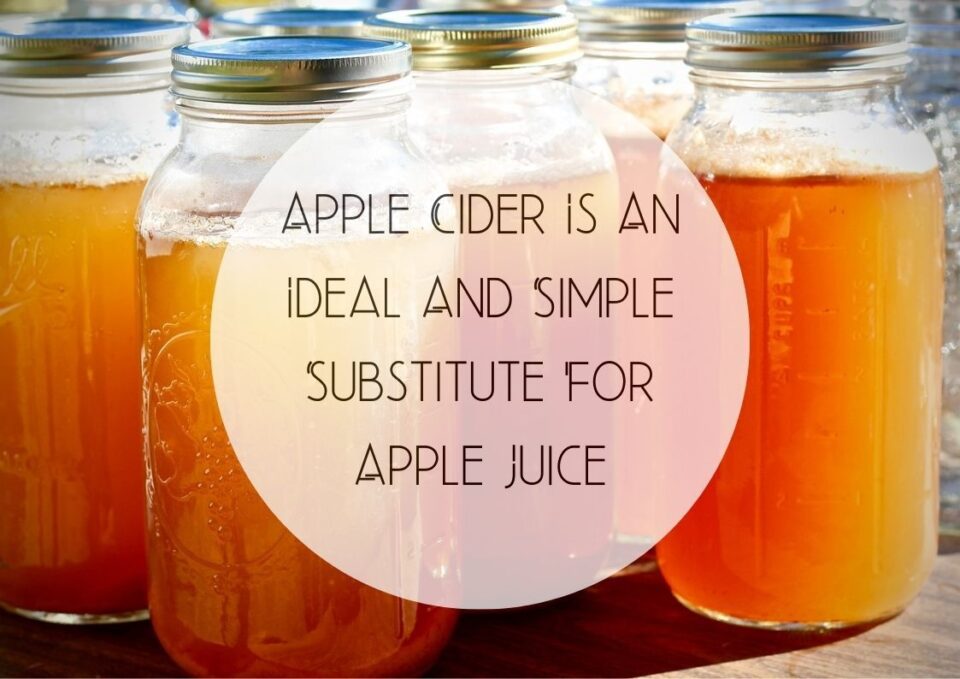
For those in the USA, apple cider is pretty much a natural substitute for apple juice. Usually, apple cider is unfiltered unsweetened apple juice. So, you could bank on apple cider to fulfill any role that apple juice handles.
If you intend to use this in a cocktail, remember that apple cider could make the result a bit cloudier (since it is unfiltered), but that may not be a problem for most recipes.
For other recipes, where the sweetness of apple juice might be desirable (since it is sweeter than cider), you can consider adding an additional sweetener of your choice. Although, this is rarely required, especially if your original recipe intended for unsweetened apple juice. And let’s face it, apple cider does carry some sweetness as well.
Generally, you can substitute apple juice for an equal amount of apple cider.
Hard Apple Cider – Quick Notes
I made this section to clear a bit of the global naming convention. In the USA, apple cider is, generally, unfiltered apple juice. Hard apple cider in the USA represents apple cider that has been allowed to ferment, thus having some alcohol content.
For much of the world, the term apple cider simply means hard apple cider. It has some alcohol content and of course, doesn’t taste nearly the same as what you’d expect from apple juice or the American apple cider.
That said, it is possible to use apple cider (or hard apple cider) as an apple juice substitute in many recipes. You would, however, want to accommodate for the presence of alcohol. This can usually be achieved by using a smaller quantity of hard apple cider as compared to the amount of apple juice needed in the recipe.
2. Other Fruit Juices
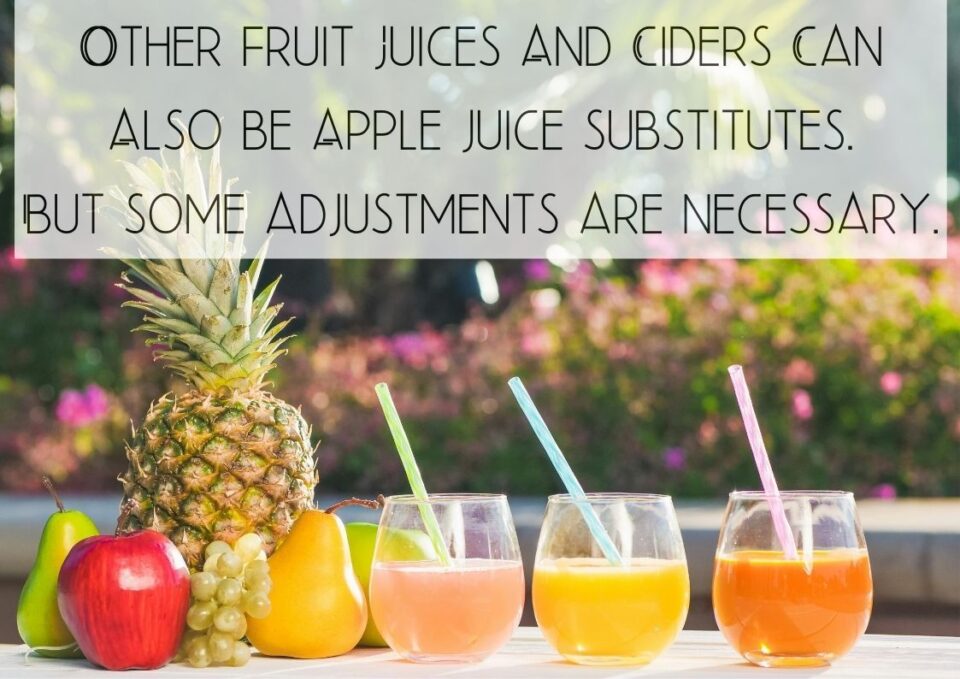
As you might guess, many other fruit juices can take on the role of an apple juice substitute. However, there are differences to consider here, so additional factors are important to consider.
- Pear Juice: This juice is often seen as the closest approximation to apple juice. Pear juice and apple juice go through relatively similar processes and are quite similar in appearance and texture. The problem, though, is that pear juice isn’t very popular and may not be easy to get hold of.
For most recipes, you can substitute pear juice for apple juice in a 1:1 ratio. - White Grape Juice: Here’s another useful, and relatively easier to find option. White grape juice is a very convenient substitute for apple juice in most recipes, even many cocktails. Of course, it is natural to expect subtle changes in flavor, but the overall substitution works just fine in a 1:1 ratio.
- Citrus Fruits Juice (Lemon, Lime, Orange): Citrus fruits won’t replace apple juice in cocktails/mocktails or even several soup or broth recipes, but they can work in marinades. When taking this route, expect a notable change in flavor. Plus, you’ll have to tinker around with the time for marinades.
While apple juice can handle marinating overnight, orange juice, lime juice, and lemon juice are too acidic for that. Something around three hours should be enough.
Or, you could experiment a bit by diluting these juices. So, if a recipe asks for 1 cup of apple juice, you could start by using a quarter (¼) or even less of lemon juice and filling the rest of the cup with water. Orange juice typically is less acidic, so you could add more of it. However, be on guard of the citrus flavor overpowering your recipe.
It might also be useful to consider adding a little bit of sugar to offset the citrus-tangy flavor from these juices. - Pineapple Juice: The sweet and flavorful pineapple juice can replace apple juice in most cocktails and mocktails without a problem. But much like citrus fruit juices, it can be more acidic than apple juice.
You could use a similar method as citrus fruit juices for this substitution, but it’s possible to be more generous with pineapple juice. It is more acidic than apple juice, but often not as acidic as lemon or lime juice.
So, when used with marinades, pineapple juice can be a suitable option when worked with a reduced time or with adequate dilution.
3. Some Vinegar Ideas (Best Avoided)
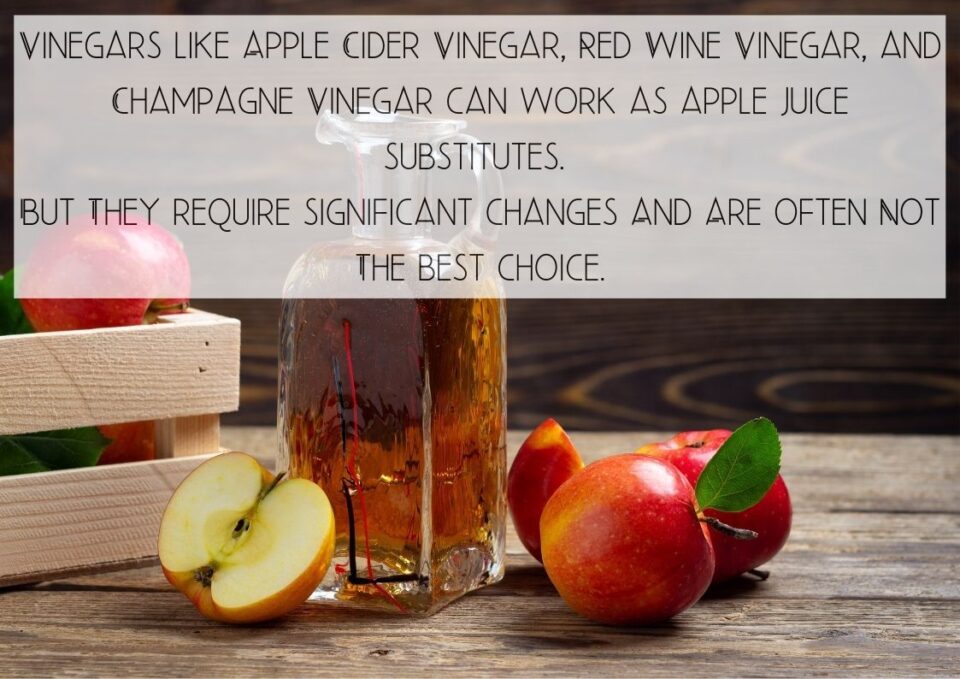
Many vinegar ideas are often presented as substitutes for apple juice. My suggestion is that these are best avoided, unless you’re pretty comfortable with alterations such change can bring, and are comfortable with managing this substitution.
A vinegar-style substitution, when attempted, should be limited to savory recipes like soups, broths, or marinades. And even then, proceed with caution.
Any vinegar is likely to be significantly more acidic than apple juice and have a much stronger flavor. Yes, this applies even to the more delicate and complex-flavored options like champagne vinegar, red wine vinegar, and similar options.
As such, the substitution ratios can be fairly drastic. For example, if a savory recipe calls for a cup of apple juice, adding just a teaspoon of apple cider vinegar could be enough. You may want to adjust for the remaining liquid by adding water.
When using apple cider vinegar (or other delicate vinegars) for replacing apple juice in a marinade, you might want to follow a similar philosophy. Significantly diluting the vinegar or reducing the time for marinating can work. Adding some sugar to the mix helps reduce the tartness of vinegar, while also keeping some flavors, like the touch of apple flavors from apple cider vinegar.
4. Beer
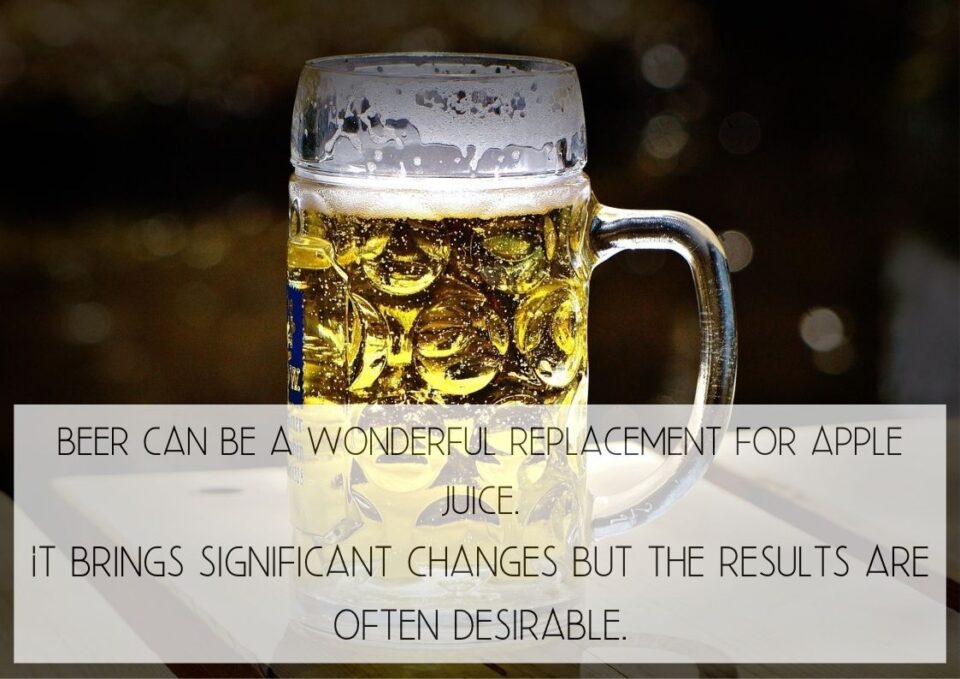
Well, here’s a substitution idea that can work, provided your tastebuds allow for it. And there’s a good chance they will – after all, beer can be quite flavorful and desirable in a whole bunch of recipes.
Yet, it’s worth remembering that beer is more of a replacement, rather than a substitute. It can significantly alter the flavor profile and texture of a food as compared to apple juice, so this is a change you’ll want to think on before going through. Plus, beer brings alcohol to a recipe, so that’s another point to consider.
While replacing apple juice in beverages with beer is debatable, considering it changes the entire flavor profile, other recipes might be more forgiving.
Baking has a similar approach, where personal preferences might decide if you want to replace apple juice with beer.
Savory recipes, on the other hand, might welcome beer. Soups and broths can benefit from the deep flavors of beer, with the added benefits of the savory meatiness or umami goodness that it brings.
A similar approach can work for marinades. In these recipes, it can work a role very similar to apple juice. Heck, if you’re so inclined, you could even use beer for the foil wrapper, or spritz it on the meat while cooking.
It’s worth remembering that apple juice is much sweeter than beer. You might want to add a couple teaspoons of sugar to the recipe when substituting apple juice with beer.
5. Soda (Limited Use)

Using sodas (cold drinks or fizzy drinks) in place of apple juice is a plausible idea in some cases, especially for marinades. Things like Coca Cola, Dr Pepper, and even root beer have gained some acceptance for their use in marinades.
I think something like Sprite or even root beer might be a nice touch, since the artificial flavoring is not as pronounced. Although there are those who swear by the use of Coca Cola as well, so well, make your own choice!
However, when going this route, you will have to consider that these sodas are significantly more acidic and sugary when compared to apple juice. You could work by diluting them and reducing the time of the marinade. Allowing them a little longer than 3-4 hours to marinate could work.
Another obvious problem here is the sugar content. The high sugar content of these beverages also means that you have to worry how sugar interacts with the recipe, rather than just the taste. Sugar can burn easily, and with the high concentration of sugar in these sodas, you’d have to be extra careful.
6. Wine
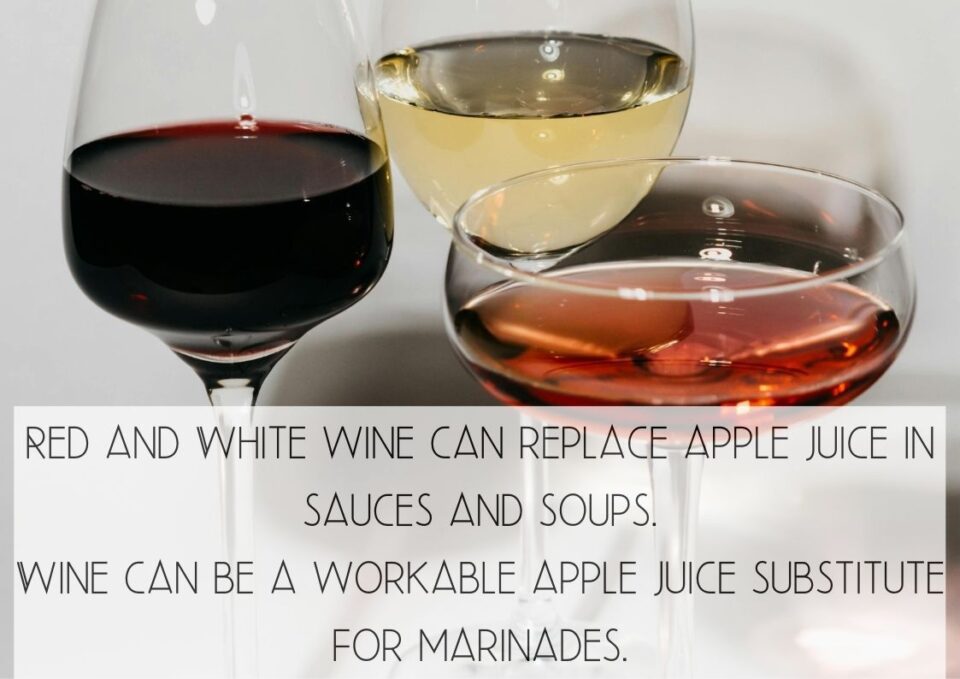
Using wine as a substitute for apple juice in a marinade can be controversial. Some people like their addition, while others find that wine can make the meat somewhat dry and denatured.
Adding half a cup of red wine with a few drops of lemon juice and apple cider vinegar could work. You will want to reduce the marinating time to about 4 hours, probably less.
White wine could be used similarly for more subtle flavors and with less of a worry about how it interacts with the colors of the recipe.
Another aspect where wine shines is for sauces and soups. Use it in place of apple juice, give the alcohol enough time to evaporate, and you could have a wonderful savory soup or sauce with deep flavors. In fact, many recipes that currently recommend apple juice come from original recipes where something like wine was used. Red wines like merlot could work, perhaps even a chardonnay. White wine could also work in a similar sense, where you don’t want the flavors to be as pronounced.
7. Vegetable Stock Or Chicken Stock
Vegetable or chicken stock can work in some recipes for soups and broths as apple juice substitutes. These are not ideal substitutes, but can work in a pinch. You replace the apple juice with the stock of your choice, then add a little bit of sugar and perhaps a splash of apple cider vinegar to keep the flavors going.
This is a workable option, but again, not one that you could rely on as a complete replacement for apple juice.
Picking The Right Apple Juice Substitute For You
We’ve discussed the substitutes for apple juice in relative detail with the discussion here. As one might guess, the discussion often veers towards the substitution for apple juice in marinades, with occasional discussion for soups and sauces.
The simple reason for this is that while apple juice replacement or substitution is more intuitive in beverages, it doesn’t quite work the same way for savory recipes or marinades. The options above should make the decisions easier for you in a whole lot of recipes.
Speaking of marinades, incidentally, there is another thing you can do – rather than looking for an apple juice substitute, simply skip it! A classic marinade has no use of apple juice and you could work with a simple recipe rather than adding complexity.
But if you must have those flavors, our discussion here should give you plenty to work with!

